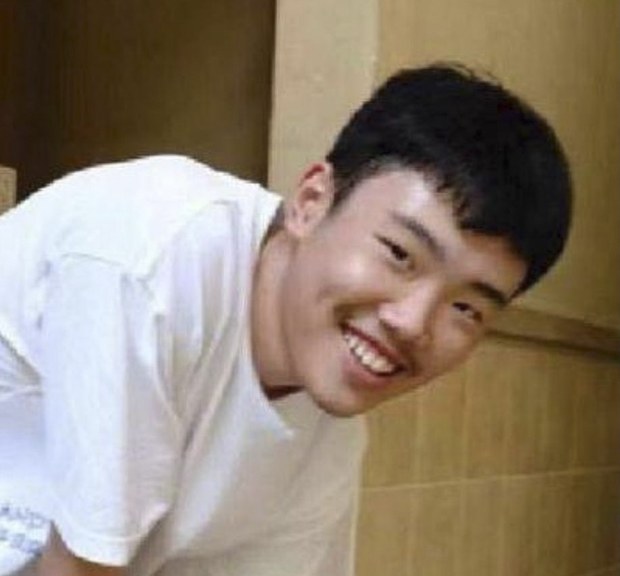Police claim that hanged teenager took own life sparks public skepticism
Share

A Jiangxi province police official says Chinese high-school student Hu Xinyu died by suicide.
High school student Hu Xinyu, whose body was found hanging from a tree in a wooded area near his school, died by suicide using shoelaces, police investigating his death announced on Thursday.
The discovery of Hu, 15, who had gone missing for three months, has taken Chinese social media by storm, sparking speculation over an apparent spike in cases of missing teens.
The investigation had ruled out homicide in his death, Hu Mansong, deputy police chief for the eastern province of Jiangxi said at a press conference Thursday, and autopsy results and lack of sign of a struggle near where his body was found pointed to suicide.
An analysis of a digital voice recorder found with the body had yielded recordings made by Hu, contemplating whether or not to jump from the fifth floor of his dorm building earlier on Oct. 14, the police official said.
“It’s all meaningless … My mind has become clouded today and I just want to die now,” the paper quoted the transcript of the recordings as saying. But the transcripts weren’t played at Thursday’s press conference.
The voice recorder contained two recordings on Oct. 14, one at 5:40 pm and the other at 11:08 pm. ”It appears that he made both recordings while attempting to take his life,” the paper paraphrased the deputy police chief as saying.
Video footage from the school’s network of more than 100 surveillance cameras showed Hu in the school dormitories, where he was a boarder, at 5:48 p.m. on Oct. 14, the day he went missing.
His “highly decomposed” body was found by an employee of a nearby grain depot on Jan. 28, the English-language China Daily newspaper reported.
Public skepticism
The police announcement came amid growing public skepticism over the official narrative around Hu’s death. Many asked why the police had refused to investigate when the boy’s family first reported him missing, and others wondered why they didn’t find him sooner, given that he was found just 400 meters from his dormitory.
Hu Mansong, the deputy police chief, said that police searched the grain depot four times in October and November but had failed to thoroughly search the surrounding woods, and had “learned a lesson from this mistake,” the China Daily quoted him as saying.
The case has, like many other high-profile crimes amid dwindling public trust in official narratives, gone viral on Chinese social media platforms.
News stories about Hu’s case initially had sparked speculation that missing teens had been victims of organ trafficking gangs, but that seems to have died down. Police said none of Hu’s organs were missing, but that they had all rotted.
“After Thursday’s press conference, it has once again become clear just how big the social media attention is for this case,” the What’s On Weibo website reported. It said the hashtag #Content_of_Hu_Xinyu_Voice_Recorder had received over 390 million views on Weibo, while the hashtag #Hu_Xinyu_Expressed_Will_to_Commit_Suicide_on_Voice_Recorder garnered more than 640 million views.
The hashtag #Hu_Xinyu_Died_by_Hanging_himself received more than 950 million views according to the website, which tracks trends on the microblogging platform Sina Weibo.
Failure to explain
Some social media users decided to test the strength of shoelaces to see if the police’s claim that Hu had hanged himself with them was plausible. They found that the shoelaces broke with loads of more than 100 kilograms.
Shandong-based lawyer Feng Yanqiang said the police news conference had been short on forensic detail to back up its claims.
“They talked about a lot of it in general terms, and the police brought too much personal emotion into play when it came to discussing the actual evidence,” Feng said. “It was as if they were performing Hu Xinyu, which I found pretty disgusting.”
Feng said police had also failed to explain why they had refused to investigate Hu’s disappearance when the family reported him missing.
But the most notable absence was the alleged voice recordings that led police to claim Hu had taken his own life, he said.
“Have you heard those audio recordings? We haven’t,” Feng said.
Lingering questions
Fellow lawyer Bao Longjun agreed, saying the police’s claim that Hu’s death was a suicide wasn’t well backed up by evidence.
“There are still many questions that need to be addressed, such as how did Hu get into the grain depot area, and how did he actually commit suicide,” Bao said. “It’s too early to conclude that this was a suicide.”
Bao said current police regulations require officers to investigate a missing person if no reason can be found for their disappearance within three months of receiving a report. Police actually appear to have started looking for Hu some time in November, he said.
“Current Chinese government regulations on the reporting and investigation of missing persons cases are very unclear,” Bao said. “The police lack clear procedural guidelines … which is a flaw in the system.”
A former police officer who served in the southern city of Guangzhou for many years, and who uses the Twitter handle “Second Uncle” said the government is used to covering up the truth of sensitive cases.
“The Chinese Communist Party has always been contemptuous and afraid of the public’s right to know,” he said. “It has a habit of covering things up and manipulating the flow of information, whether the case is big or small.”
“Then, the public starts to use their imaginations to make their own inferences because they don’t have access to the information,” he said. “Actually, even if they were prepared to tell the truth, nobody would likely believe it [at this stage].”
Translated by Luisetta Mudie. Edited by Malcolm Foster.







